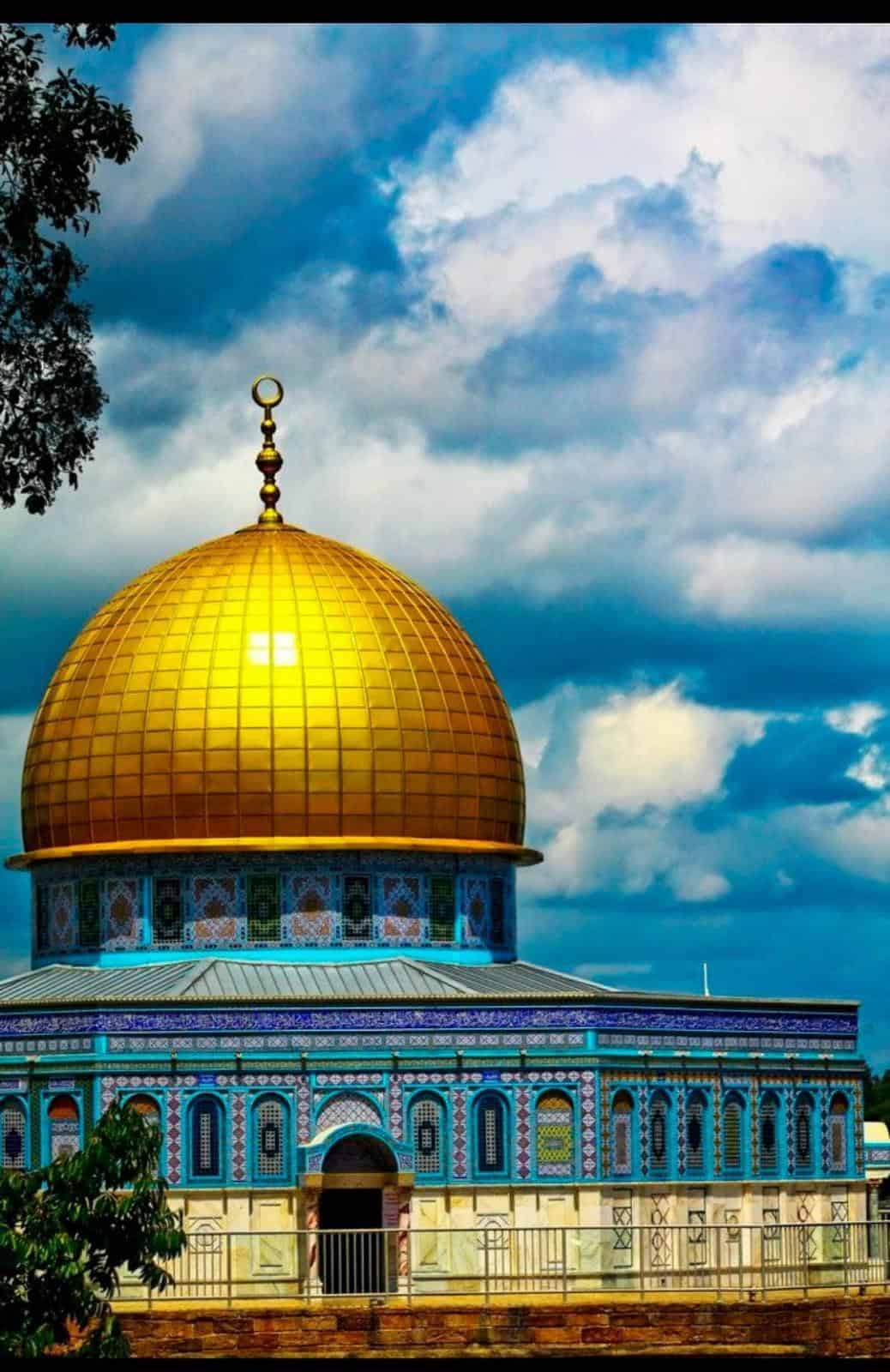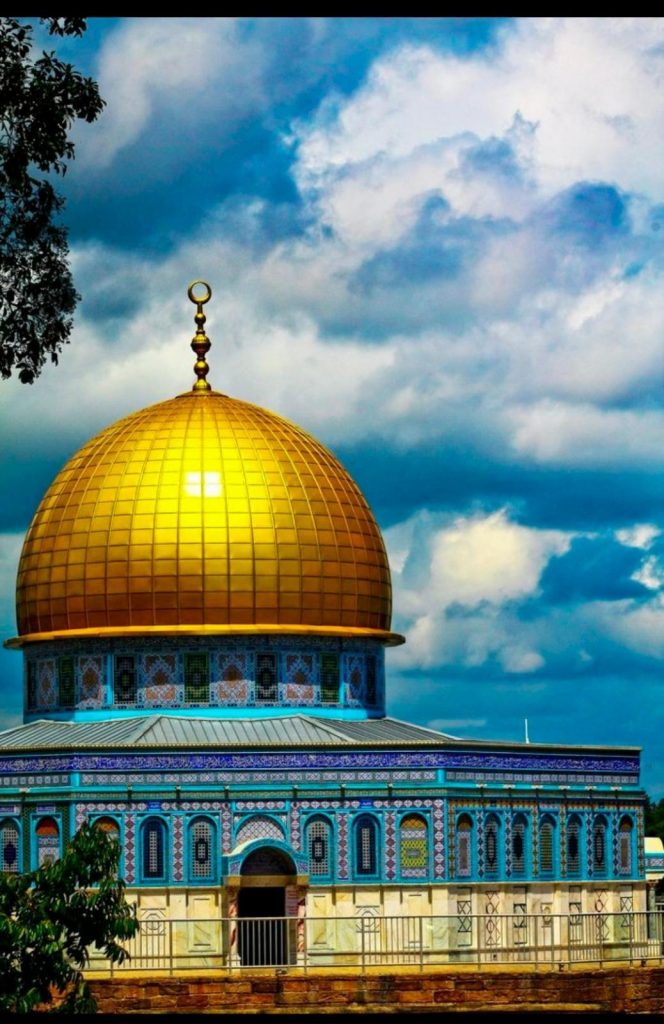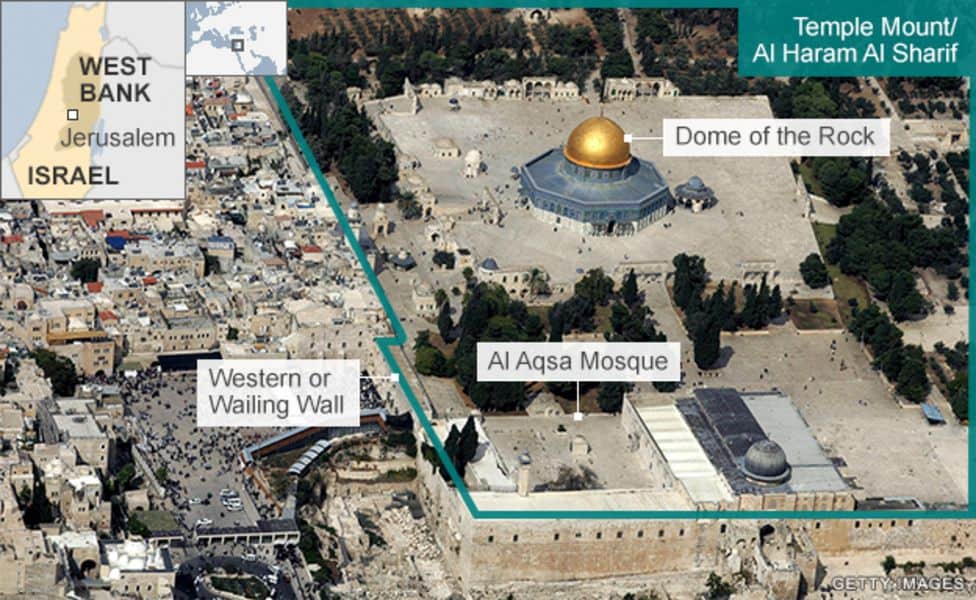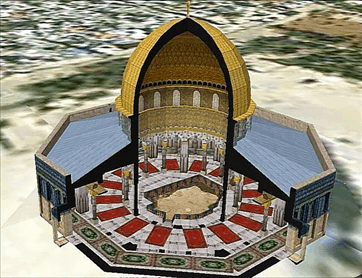Palestine – the Islamic perspective

What are the virtues for us of Bait al Maqdis (Jerusalem)
Surat al Isra in the Quran is named after the journey which the Prophet (peace be on him) took from Makkah to Jerusalem before he ascended the skies to heaven on a special creature, called Buraq, where he received the command to perform salah five times a day.

Glory be to the One Who took His servant ˹Muḥammad˺ by night from the Sacred Mosque to the Farthest Mosque whose surroundings We have blessed, so that We may show him some of Our signs. Indeed, He alone is the All-Hearing, All-Seeing. [17:1]
Allah Almighty chose Bait al Maqdis for this momentous occasion. The Prophet (peace be on him) could have ascended from Makkah, but Allah had decreed that he would travel to Bait al Maqdis, out of all possible locations in the world. This shows the significance of Bait al Maqdis.
Allah made these places special for a reason. He selected them from His wisdom, as He selected months like Ramadan, days, like Jummuah, and people, like the prophets. Bait al Maqdis is where Ibrahim, Dawood and Suleman lived. It is very blessed land.
The first qibla
Bait al Maqdis was the first qibla, the direction in which all believers prayed until it was changed to the Kaaba in Makkah. The Isra took place about 18 months to two years before the Prophet (peace be on him) migrated to Madinah. The command to pray salah 5 times began from that moment and was unified in prayer towards that focal point.
The whole ummah continued to pray in that direction til 16-17 months after migration, as mentioned by Bukhari and Muslim, before the qibla was changed to the Kaaba, which had been built by Ibrahim and Ismail (peace be on them). This means Jerusalem was the Qibla for at least 3 years.
Why did Allah not command the Prophet (peace be on him) to pray towards Kaaba?
There were many reasons, Makkah was full of idols and dominated by the Quraysh. They rejected the message of Islam and spread rumours against the Prophet (peace be on him). Allah was demonstrating that it is He who decides what He makes holy, and what will be the Qibla. It is for people to follow His commands, our slogan has to be, ‘We hear and we obey.’ [24:51]
People questioned and mocked the change in qibla, so Allah Almighty revealed the verse that the East and West belong to Him:
The fools among the people will say: What has turned them from their qibla which they had? Say: The East and the West belong only to Allah; He guides whom He likes to the right path. [2:142]
The Prophet (peace be on him) prayed towards Kaaba from that time and that will remain the direction til the Day of Judgement.
One of the three holiest sites
Makkah, Bait al Maqdis and Madinah are the three sacred places in Islam as chosen by Allah. Makkah is known as Al Haram, because it is the prohibited place to hunt or kill anyone or to commit any evil act. You are not even allowed to chop down any trees, as it is a protected area for all living things. This is a special protection given to Makkah as the holy land. Praying in Makkah carries the reward of a 100,000 prayers in another location. Praying in Madinah is 1,000. Praying in Masjid al Aqsa carries the reward of 250, 500 or 1,000 depending on the narration.
“A prayer in the Masjid al-Haram is akin to one hundred thousand prayers, a prayer in my mosque is like a thousand prayers, and a prayer in the Baitul Maqdis is like five hundred prayers [in reward].”
[Tabarani: Mu`jam al Kabir]
Allah’s Messenger (may peace be upon him) said:
Do not set out on a journey (for religious devotion) but for the three mosques – for this mosque of mine (at Medina), the Sacred Mosque (at Mecca), and the Mosque al-Aqsa (Bait al-Maqdis). [Sahih Muslim]
Literature on the holy lands
Scholars of the ummah have been keen throughout our history to write about Maqdis and Bait al Maqdis. We have a vast amount of literature dedicated to the virtues of our three holy sites, including Bait al Maqdis alone, like the book of Imam Diya ud Deen al Maqdisi (d. 643 AH/1245 CE), Fada’il Maqdisi. Dr Shaykh Muti’ al Hafiz (rahimaullahu) wrote a book on its virtues in Arabic, quoting 66 hadith in 11 chapters, covering the occurrence of the Isra, and the rewards of praying there.
Al Aqsa the second mosque built
In Surat Al Isra Allah mentioned the Masjid al Alqsa. Al Aqsa means farthest place, because it was far from Makkah over 1,400 km away.
We were told that the Kaaba was the first mosque to be built, which was built by Ibrahim (peace be on them) with his son Ismail, then the mosque of Al Aqsa which was built 40 years after it.
وَعَنْ أَبِي ذَرٍّ قَالَ: قُلْتُ: يَا رَسُولَ اللَّهِ أَيُّ مَسْجِدٍ وُضِعَ فِي الْأَرْضِ أَوَّلُ؟ قَالَ: «الْمَسْجِدُ الْحَرَامُ» قَالَ: قُلْتُ: ثُمَّ أَيْ؟ قَالَ: «ثُمَّ الْمَسْجِدُ الْأَقْصَى» . قُلْتُ: كَمْ بَيْنَهُمَا؟ قَالَ: «أَرْبَعُونَ عَامًا ثُمَّ الْأَرْضُ لَكَ مَسْجِدٌ فَحَيْثُمَا أَدْرَكَتْكَ الصَّلَاةُ فصل» مُتَّفق عَلَيْهِ
Abu Dharr said that he asked God’s Messenger (peace be on him) which mosque was set up first in the earth and was told that it was the sacred mosque. He asked which came next and was told that it was the Aqsa mosque. He asked how long a space of time separated their building and the Prophet told him it was forty years, adding, “Then the earth is a mosque for you, so pray wherever you are at the time of prayer.” (Bukhari and Muslim)
The Blessed Masjid Al-Aqsa sanctuary includes the grey-domed Qibly Masjid, where the Prophet (peace be on him) led all the Prophets (as) in prayer during the miraculous Night Journey (Al-Isra’).
The Dome of the Rock Masjid, contains the rock from which the Prophet (peace be on him) ascended to heaven. Its Arabic name is Qubbat as-Saqqarah. This sits magnificently at the centre of the complex, and is famous for its golden dome.
The holy land was not promised to Bani Israil without conditions.
They did not fulfil the conditions, so it is not their Promised Land.
In Surat al Maidah Allah Almighty told us how He offered Bani Israel the land of Palestine, but that they did not attain it. Musa (peace be on him) told them to enter the land which would win when they fought the tyrants who ruled it. However, they refused. Therefore they did not get it, and instead they were punished for their disobedience by being lost in the dessert for 40 years:
يَاقَوْمِ ادْخُلُوا الاٌّرْضَ المُقَدَّسَةَ الَّتِى كَتَبَ اللَّهُ لَكُمْ وَلاَ تَرْتَدُّوا عَلَى أَدْبَـرِكُمْ فَتَنْقَلِبُوا خَـسِرِينَ
“O my people! Enter the Holy Land which Allah has assigned to you and turn not back; for then you will be returned as losers.” [5:21]
قَالُوا يَامُوسَى إِنَّ فِيهَا قَوْماً جَبَّارِينَ وَإِنَّا لَن نَّدْخُلَهَا حَتَّى يَخْرُجُواْ مِنْهَا فَإِن يَخْرُجُواْ مِنْهَا فَإِنَّا دَخِلُونَ
“They said, “O Musa! In it are a people of great strength, and we shall never enter it, till they leave it; when they leave, then we will enter.” [5:22]
قَالَ رَجُلَانِ مِنَ ٱلَّذِينَ يَخَافُونَ أَنْعَمَ ٱللَّهُ عَلَيْهِمَا ٱدْخُلُوا۟ عَلَيْهِمُ ٱلْبَابَ فَإِذَا دَخَلْتُمُوهُ فَإِنَّكُمْ غَـٰلِبُونَ ۚ وَعَلَى ٱللَّهِ فَتَوَكَّلُوٓا۟ إِن كُنتُم مُّؤْمِنِينَ
Two God-fearing men—who had been blessed by Allah—said, “Surprise them through the gate. If you do, you will certainly prevail. Put your trust in Allah if you are ˹truly˺ believers.” [5:23]
قَالُوا۟ يَـٰمُوسَىٰٓ إِنَّا لَن نَّدْخُلَهَآ أَبَدًا مَّا دَامُوا۟ فِيهَا ۖ فَٱذْهَبْ أَنتَ وَرَبُّكَ فَقَـٰتِلَآ إِنَّا هَـٰهُنَا قَـٰعِدُونَ
[But] they said: “O Moses! Behold, never shall we enter that [land] so long as those others are in it. Go forth, then, thou and thy Sustainer, and fight, both of you! We, behold, shall remain here!” [5:24]
قَالَ رَبِّ إِنِّى لَآ أَمْلِكُ إِلَّا نَفْسِى وَأَخِى ۖ فَٱفْرُقْ بَيْنَنَا وَبَيْنَ ٱلْقَوْمِ ٱلْفَـٰسِقِينَ
Hearing this Musa prayed, “O my Rabb! I have no control over anyone except myself and my brother. Please, set us apart from these disobedient people.” [5:25]
قَالَ فَاِنَّهَا مُحَرَّمَةٌ عَلَيۡهِمۡ اَرۡبَعِيۡنَ سَنَةً ۚ يَتِيۡهُوۡنَ فِى الۡاَرۡضِ ؕ فَلَا تَاۡسَ عَلَى الۡقَوۡمِ الۡفٰسِقِيۡنَ
Allah said: ‘This land will now be forbidden to them for forty years and they will remain wandering about on the earth. Do not grieve over the condition of these transgressing people. [5:26]
We see here that the land was not their birth right. It was not theirs by virtue of their race or colour. Allah is not racist. He does not discriminate between nationalities. They were commanded to enter the land, but they did not. It would have been theirs if they followed the commands and showed obedience. He does not give based on who you are, but based on your character, actions and obedience.
The land was not destined for them without an expiry date or conditions. They refused to budge. They told Musa to call on his Lord and in another scene, described in Surat al Baqarah, they said, ‘We hear and we disobey’ [2:93]. Our slogan is ‘we hear and we obey’. Allah barred them from entry for 40 years. If they showed obedience, He would grant them it.
Similarly, Makkah was not given to the Prophet (peace be on him) because he was from Quraysh but because he was obedient to Allah and followed His commands. Allah is the Lord of Justice. When you follow the conditions, you get what you were promised. If you do not, it is taken away from you. This happened to many nations.
Musa did not reach Palestine
Musa (peace be on him) died in the dessert and was buried very close to Bait al Maqdis. There is no authentic evidence where his actual grave is, though the Prophet (peace be on him) visited it during the Isra wal Miraj.
Abu Hurayrah reports that the Prophet (peace be on him) said:
“The angel of death was sent to Musa. When he came to Musa, Musa slapped him on the eye. The angel returned to Allah and said, ‘You have sent me to a servant who does not want to die’. Allah ordered the angel, ‘Return to him and tell him to put his hand on the back of an Ox and for every hair that will come under it, he will be granted one year of life’. Musa asked, ‘O Lord! What will happen after that’? Allah replied, ‘Then death’. Musa decided, ‘Let it be now’. Musa then requested Allah to let him die close to the Sacred Land (near Masjid al-Aqsa) so much so that he would be at a distance of a stone’s throw from it”. Abu Hurayrah added, the Prophet (peace be on him) then said, “If I were there, I would show you his grave below the red sand hill on the side of the road.”
Sulaiman and Dawud
When Sulaiman bin Dawud finished building Bait ul Maqdis, he asked Allah for three things: judgment that was in harmony with His judgment, a dominion that no one after him would have, and that anyone who prayed there would emerge as free of sin as the day he was born. The Prophet (peace be on him) said:
“Two prayers were granted, and I hope that the third was also granted.” (Ibn Majah)
The Prophet Muhammad (peace be on him) said:
He said: “O Allah, bless for us our Shaam; O Allah, bless for us our Yemen.” (Bukhari)
Even from the Jewish point of view, they have different opinions. Orthodox Jews do not believe Palestine belongs to them. Palestine existed before Israel. They do not have the right to occupy other people’s land.
Glad tidings of conquering Jerusalem
The Prophet (peace be on him) predicted that Muslims would conquer Jerusalem, though at the time of his prediction, as they were digging a trench to defend themselves from a massive attack, and were fearful for their lives and conquering Jerusalem seemed impossible.
On the authority of Al-Bara’ Bin Athib (may Allah be pleased with him), he said:
«لَمَّا كَانَ حِينُ أَمَرَنَا رَسُولُ اللَّهِ صلى الله عليه وسلم بِحَفْرِ الْخَنْدَقِ عَرَضَتْ لَنَا فِي بَعْضِ الْخَنْدَقِ صَخْرَةٌ لَا تَأْخُذُ فِيهَا الْمَعَاوِلُ، فَاشْتَكَيْنَا ذَلِكَ إِلَى النَّبِيِّ صلى الله عليه وسلم، فَجَاءَ فَأَخَذَ الْمِعْوَلَ فَقَالَ: بِسْمِ اللَّهِ. فَضَرَبَ ضَرْبَةً فَكَسَرَ ثُلُثَهَا، وَقَالَ: اللَّهُ أَكْبَرُ أُعْطِيتُ مَفَاتِيحَ الشَّامِ، وَاللَّهِ إِنِّي لَأُبْصِرُ قُصُورَهَا الْحُمْرَ السَّاعَةَ. ثُمَّ ضَرَبَ الثَّانِيَةَ فَقَطَعَ الثُّلُثَ الْآخَرَ فَقَالَ: اللَّهُ أَكْبَرُ، أُعْطِيتُ مَفَاتِيحَ فَارِسٍ، وَاللَّهِ إِنِّي لَأُبْصِرُ قَصْرَ الْمَدَائِنِ أَبْيَضَ. ثُمَّ ضَرَبَ الثَّالِثَةَ وَقَالَ: بِسْمِ اللَّهِ، فَقَطَعَ بَقِيَّةَ الْحَجَرِ فَقَالَ: اللَّهُ أَكْبَرُ أُعْطِيتُ مَفَاتِيحَ الْيَمَنِ، وَاللَّهِ إِنِّي لَأُبْصِرُ أَبْوَابَ صَنْعَاءَ مِنْ مَكَانِي هَذَا السَّاعَةَ»
“When the Messenger of Allah (peace be on him) ordered us to dig the trench, a rock emerged in the trench that we could not break with our axes, we reported to the Prophet (peace be on him), he took the axe and said: In the name of Allah. Then he struck and broke a third of the rock, and said: Allah Akbar (Allah is the greatest), I was given the keys of Ash-Sham; by Allah I can see its red palaces now. Then he struck it (rock) the second time, and he broke the other third, and said: Allah Akbar (Allah is the greatest), I was given the keys of Persia; by Allah I can see its white Mada’in palace. Then he ﷺ struck it the third time and said: In the name of Allah and broke the rest of the stone, he said: Allah Akbar (Allah is the greatest) I was given the keys of Yemen, and by Allah I can see the gates of Sanaa, from my place now” (Fath al-Bari by Ibn Hajar)
Islam in Palestine
As predicted, in 637 CE, Umar bin Khattab, the third caliph of the Muslims, conquered Bait al Maqdis peacefully, following the surrender of the Patriarch Sophronius, a representative of the Byzantine government, and leader in the Christian Church. He handed over the keys to the Church of the Holy Sepulchre to Umar, and these have been held by Muslims ever since. Umar made a special treaty, Al ‘Uhda al Umariyya to preserve their rights and their right to worship.
In the name of God, the Merciful, the Compassionate. This is the assurance of safety which the servant of God, ʿUmar, the Commander of the Faithful, has given to the people of Aelia [the Roman name for Jerusalem]. He has given them an assurance of safety for themselves, for their property, their churches, their crosses, the sick and healthy of the city and for all the rituals which belong to their religion. Their churches will not be inhabited by Muslims and will not be destroyed. Neither they, nor the land on which they stand, nor their cross, nor their property will be damaged. They will not be forcibly converted. And Jews will not live in Aelia with them. The people of Jerusalem must pay the taxes like the people of other cities and must expel the Byzantines and the robbers. Those of the people of Jerusalem who want to leave with the Byzantines, take their property and abandon their churches and crosses will be safe until they reach their place of refuge. The villagers [who had taken refuge in the city at the time of the conquest] may remain in the city if they wish but must pay taxes like the citizens. Those who wish may go with the Byzantines and those who wish may return to their families. Nothing is to be taken from them before their harvest is reaped. If they pay their taxes according to their obligations, then the conditions laid out in this letter are under the covenant of God, are the responsibility of His Prophet, of the caliphs and of the faithful. Witnessed by: Khālid b. Walīd; ʿAmr b. al-ʿĀs; ʿAbd al-Rahmān b. al-ʿAwf; Muʿāwiya b. Abī Sufyān.
History of the Land
Christians and Jews lived side by side with Muslims for 1300 years until the recent problems started in 1947. We lived with mutual respect, and held no malice towards them. We view them as People of the Book, particularly Jewish people as their aqeedah is monotheistic.
Shibli Zaman, the Texan writer with a background in Semitic linguistics and philology who has studied Arabic, Hebrew, Aramaic and Greek, summarised the history of the land as follows:
Though there is a perception spread by Zionists that Jews have an ancestral right to the land, and entitlement and that they were ‘the original inhabitants’ of Palestine and, thereby, Jerusalem. Historically this has never been the case.
The Jews never held Jerusalem for any significant amount of time compared to all the other nations that lived and ruled there.
For roughly 3500 years, (the Proto-Canaanite period), Jerusalem belonged to the Canaanites who worshipped many gods and goddesses.
The first apparent mention of Jerusalem was only in 2,000BC as ‘Rusalimum’ texts from Egypt’s Middle Kingdom.
The territory passed from the Canaanites to the Egyptians. Eventually Jerusalem was taken by King David in 1010BC and lost to the Egyptians just 85 years later, in 925BC. Jehoash of Israel briefly recaptured it in 786BC but then lost it to the Assyrians 46 years later in 740BC. This makes the Jewish rule over Jerusalem a total of 131 years. Not dissimilar to length of time the Crusaders’ ruled Jerusalem in the Middle Ages.
The Jewish Hasmoneans re-took it in 140BC under Simon Thassi but then lost it to the Persian Seleucides in 134. That’s 6 more years of Jewish rule. Due to a Seleucid civil war, Judeah became independent in the chaos in 116BC. In 87BC the Jewish Hasmonean king executed 800 Jews for sedition. In 47BC they lost Jerusalem again, this time to the Romans. That’s 69 years of rule. If we add up these years, it is 206 years.
The Pre-Constantine Romans ruled it for 250 years.
The Christian Byzantines ruled it for 304 years.
The Muslims ruled it under the Rashidun, Umayyad and Abbasid Empires for 332 years.
The Muslim Fatimids ruled it for 129 years.
The Crusaders took it from the Muslims and held it for 88 years.
The Muslim ruler Saladin conquered it in 1187 and his descendants held it for 63 years.
The Muslim Mamluk Empire ruled it for 236 years.
The Ottomans ruled it for 401 years.
To put the length of time Jerusalem was ruled into perspective, Jews ruled Palestine for barely over 2 centuries, Christians ruled it for nearly 4 centuries and Muslims ruled it for over 8 centuries. During the time the Muslims ruled they lived in peace as a confederation.
The people who defend Palestine will be rewarded
Abu Umamah Al-Bahili (may Allah be pleased with him) reported that the Prophet (peace be on him) said:
A group of people from my Ummah will continue to obey Allah’s Command, and those who let them down or oppose them shall not be able to do them any harm. They will be victorious until Allah’s Command is executed.
And they asked where are they?
He said: they are in Bait al Maqdis and the vicinity of Bait al Maqdis.
(Bukhari and Muslim and Ahmad)
In another narration it said that this would be in Sham, which is Palestine, Jordan, Syria and Lebanon.
Shaykh Haytham Tamim
Related posts
Isra wal Miraj part 1
Isra wal Miraj part 2
- The truth is more powerful than lies
- Does a bride’s wali have to be Muslim?
- Is is permissible to lead a salah split over different rooms?
- Global IT outage. When systems go down…
- The concept of worship. What are ibadah and ihsan – and how do they lead to self development?

Recommended Posts

The truth is more powerful than lies
July 26, 2024

Global IT outage. When systems go down…
July 19, 2024



